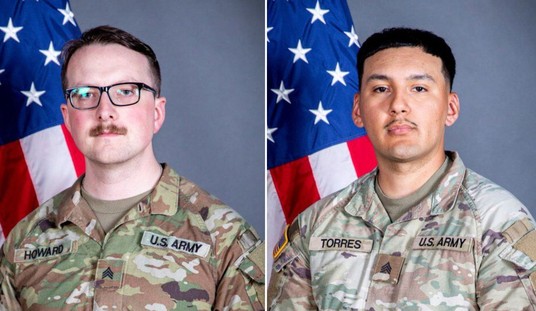Has the Obama administration decided to intervene in Syria? CBS News reports that the White House is now floating trial balloons about providing direct aid to the rebels fighting the Bashar Assad regime — “non-lethal” aid, but aid nonetheless. Even non-lethal aid allows the rebels to use other resources to improve their arms capability, and American assistance would give them a boost in prestige with other Western nations. And if any of this sounds familiar, it just means you didn’t sleep through the US-European intervention in Libya almost two years ago:
John Kerry made this a little more plain earlier today, in case that trial balloon was too subtle. Appearing in Paris with France’s foreign minister, Kerry made an explicit appeal for Western intervention:
Secretary of State John Kerry said the U.S. and its allies want to raise support for Syria’s opposition to help speed President Bashar al-Assad’s ouster.
Assad “needs to know he can’t shoot his way out of this,” Kerry said about the Syria conflict at a press conference today in Paris with French Foreign Minister Laurent Fabius. “And I think the opposition needs more help in order to convince him.”
Kerry said the U.S. and its allies are working together to forge a unified position on Assad’s exit from power. The U.S. chief diplomat is due to attend an international meeting in Rome tomorrow with members of the Syrian opposition. Kerry, on stops in Berlin yesterday and in London on Feb. 25, said the U.S. is considering a policy shift on Syria if Assad won’t join talks.
Remind me again how well these 30,000-foot interventions worked out in Egypt and Libya. In the former, we ended up assisting the Muslim Brotherhood’s ascent to power in place of a dictator who at least kept the peace with Israel. In the latter, we decapitated the Qaddafi regime and turned Libya into a failed state run by terrorist networks, and ended up getting chased out of Benghazi along with every other Western government that helped overthrow Qaddafi’s clique.
Will it be any different in Syria? Just a couple of months ago, the Obama administration named the core of the Syrian resistance a terrorist network with ties to al-Qaeda. In fact, many of their fighters come from … eastern Libya, where we helpfully provided those terrorist networks with plenty of breathing space to organize. Why would we want to extend that free space into Syria?
While you ponder that question, consider this Washington Post update on Hezbollah, which gets support from Assad and from Iran, which we’ve offered bilateral talks. If you’re wondering what they’re up to these days, it’s not diplomacy:
The Israeli tourists on Arkia Airlines Flight 161 from Tel Aviv could not have known it, but their arrival in Cyprus July 6 was watched closely. A pair of trained eyes counted each passenger as the group exited the plane and boarded a shuttle, headed for resorts that had also been carefully studied and mapped.
The bearded foreigner who silently tracked the Israelis had done his work well. He knew where the visitors would sleep, shop and eat. He knew how many security guards patrolled their hotel parking lots and how long it would take police to arrive from the station down the street.
But the watcher was being watched. When Cypriot police picked him up, the Hezbollah operative quickly acknowledged what he was doing, although he claimed not to know why.
“I was just collecting information about the Jews,” he told police, according to a sworn deposition. “This is what my organization is doing, everywhere in the world.”
That prompts this question: does Assad’s fall hurt Hezbollah? Or will a new power structure aligned with AQ in Syria strengthen Hezbollah’s efforts? If you can’t answer that question, at least we should agree that the US should know the answer before deciding to intervene on anyone’s behalf in yet another “Arab Spring” country.
Update: Perhaps in the short run, it’s not so good for Hezbollah after all (via Israel Matzav):
Russia Today on Wednesday cited Hezbollah sources as denying rebel claims that party deputy chief Naim Qassem had been seriously injured or killed in an attack on a convoy Tuesday in Syria.
Syria rebels had posted on Twitter that Qassem had been targeted in an attack on a convoy that killed Syrian regime general Mohammad Ali Durgham.
The sources told Russia Today that they expect Hezbollah Secretary General Hassan Nasrallah would tackle the “false rumors” in the speech he is set to give Wednesday evening.
But …
Lebanese newspaper al-Mustaqbal quoted the Syrian rebels as saying mines placed on the Beirut-Damascus highway had detonated as the convoy returned from a high-level security meeting in Lebanon. The explosion reportedly took place near the town of Jdeidet Yabous near the Lebanon-Syria border.
The al-Mustaqbal report made no mention of Qassem being killed in the attack, saying that he had merely been injured.








Join the conversation as a VIP Member